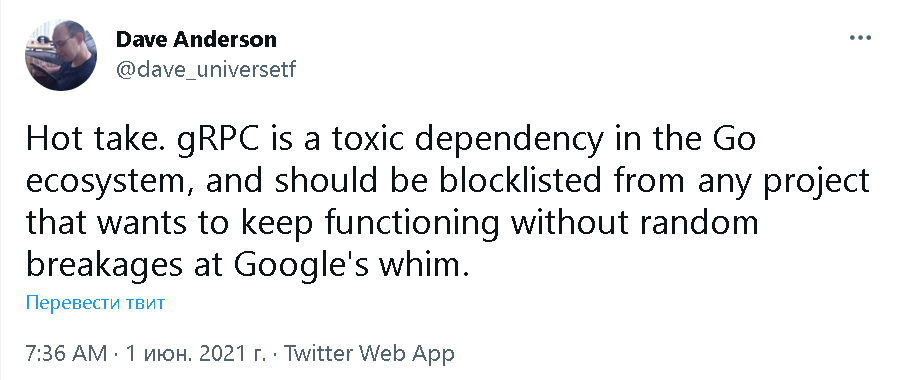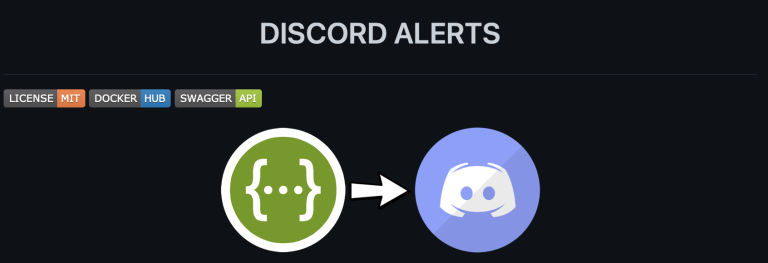Golang RPC and everything…
Disclaimer: this is not another one gRPC hate article… Oh, whait…
Let’s start from afar – you know, it has always been interesting why, in fact, there is such a wide variety of libraries for golang, for some commonly used entities, somehow – http routers (fasthttprouter forgot, as suggested in the comments) or cache?
With the choice of RPC, everything seems to be simple, gRPC is our everything (by the way, you know that g here is not Google suddenly). But it was not there…
Everything is just crazy Mary gRPC (no).
Let’s start with the fact that golang originally implemented net/rpc with its gob serializer. Type there is a need – in golang there is a solution out of the box (the same story as with the http router – it is, but everyone uses third-party solutions due to parameterized request paths). And here is an ambush – this rpc can only be used between golang applications. Then they rolled out gRPC and wrapped everything up… In short – gRPC uses http/2 and protobuf for serialization (remember, rpc is an exchange protocol plus a serializer). Moreover, gRPC implementation is available for many languages, in fact there is no binding on what to write the client and server parts. So far, so good…
However, not everything is so smooth… It is understandable that Google strives to embrace all possible cases, but! Over time, a lot of questions arose about the original implementation of gRPC. How else to explain that a bunch of firms started to cut their own RPC implementations (and / or serializers)? Also, suddenly, it turned out that the requirements for RPC inside the cloud (read between microservices) and RPC between clients outside the cloud / data center and services inside it (behind the ingress / proxy / load balancer – whatever you want to call it) are kind of “a little” different? And the choice of http / 2 as a transport – well, who knew that the implementation would go wrong (quickly) as expected.
Let’s start with serializers, the generally accepted favorite is gogo/protobuf (fork golang/protobuf), generates faster serialization code through memory reuse and reflection/pointer rejection, as well as other optimizations, but wait – aka Deprecated (and now looking for new ownership)? And this is because after the transition of Google to protobuf API v2, the gogo developers chose to abandon the project (which is unfortunate) than to rewrite its code almost entirely. Although here is an example of how they switched from gogo to API v2 – Things Learned From Trying to Migrate To Protobuf V2 API from gogoprotobuf (So Far).
But there are still enthusiasts – check it out vtprotobuf. Guys from Vitesse got confused, and still wrote their own serializer under the protobuf API v2, see the reasons and numbers in the article A new Protocol Buffers generator for Go.
By the way – not a single protobuf, as they say, for example, the same Google once muddied flatbuffers serializer. Interestingly, gRPC actually supports custom serializers, not just protobuf out of the box. Here is an example project dgraph (who started with net/rpc with flatbuffers instead of gob), and then switched to gRPC, but also with flatbuffers – Custom encoding: Go implementation in net/rpc vs grpc and why we switched.
In general, as mentioned earlier – there are 100500 different implementations of individual entities (probably, this is still not a golang-specific problem), here github turnipwhich compares the performance of all (probably) existing golang serializers, although the results there are rather strange as of now (gob is slower than JSON – how is it in general?), when compared over the years:
2022/09/05 – Go 1.16.5 linux/amd64 i7-3630QM
|
benchmark |
iter |
time/iter |
bytes/op |
allocs/op |
|
Json_Marshal-8 |
189709 |
6090 |
151 |
208 |
|
Json_Unmarshal-8 |
92833 |
12751 |
151 |
383 |
|
Gob_Marshal-8 |
71692 |
16463 |
163 |
1616 |
|
Gob_Unmarshal-8 |
14772 |
84385 |
163 |
7688 |
|
Goprotobuf_Marshal-8 |
1405010 |
854 |
53 |
64 |
|
Goprotobuf_Unmarshal-8 |
973688 |
1255 |
53 |
168 |
|
Gogoprotobuf_Marshal-8 |
3359550 |
354 |
53 |
64 |
|
Gogoprotobuf_Unmarshal-8 |
1908633 |
619 |
53 |
96 |
|
Musgo_Marshal-8 |
4294477 |
280 |
46 |
48 |
|
Musgo_Unmarshal-8 |
2498404 |
480 |
46 |
96 |
2021/06/21 – Go 1.16.5 linux/amd64 i7-3630QM
|
benchmark |
iter |
time/iter |
bytes/op |
allocs/op |
|
Json_Marshal-8 |
501478 |
2538 |
151 |
208 |
|
Json_Unmarshal-8 |
226456 |
5023 |
151 |
383 |
|
Gob_Marshal-8 |
1320562 |
882 |
63 |
40 |
|
Gob_Unmarshal-8 |
1000000 |
1041 |
63 |
112 |
|
Goprotobuf_Marshal-8 |
3247056 |
378 |
53 |
64 |
|
Goprotobuf_Unmarshal-8 |
1839267 |
651 |
53 |
168 |
|
Gogoprotobuf_Marshal-8 |
5886194 |
204 |
53 |
64 |
|
Gogoprotobuf_Unmarshal-8 |
3464098 |
345 |
53 |
96 |
|
Musgo_Marshal-8 |
12882543 |
86 |
0 |
0 |
|
Musgo_Unmarshal-8 |
3381966 |
343 |
96 |
96 |
Elsewhere found more “relevant” results:
2022/03/19 Go 1.17.8 Darwin/arm64 Apple M1 Max
|
benchmark |
iter |
time/iter |
bytes/op |
allocs/op |
|
Json_Marshal-8 |
1440837 |
822 |
148 |
208 |
|
Json_Unmarshal-8 |
653754 |
1817 |
148 |
399 |
|
Gob_Marshal-8 |
2750721 |
440 |
63 |
40 |
|
Gob_Unmarshal-8 |
2918254 |
410 |
63 |
112 |
|
Goprotobuf_Marshal-8 |
6831308 |
176 |
53 |
64 |
|
Goprotobuf_Unmarshal-8 |
5746256 |
210 |
53 |
168 |
|
Gogoprotobuf_Marshal-8 |
16528346 |
72 |
53 |
64 |
|
Gogoprotobuf_Unmarshal-8 |
12764978 |
94 |
53 |
96 |
|
Musgo_Marshal-8 |
22535546 |
53 |
48 |
0 |
|
Musgo_Unmarshal-8 |
12952696 |
90 |
48 |
96 |





